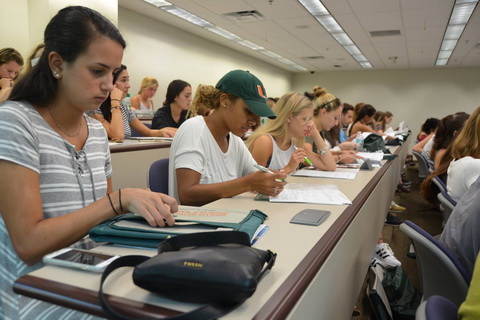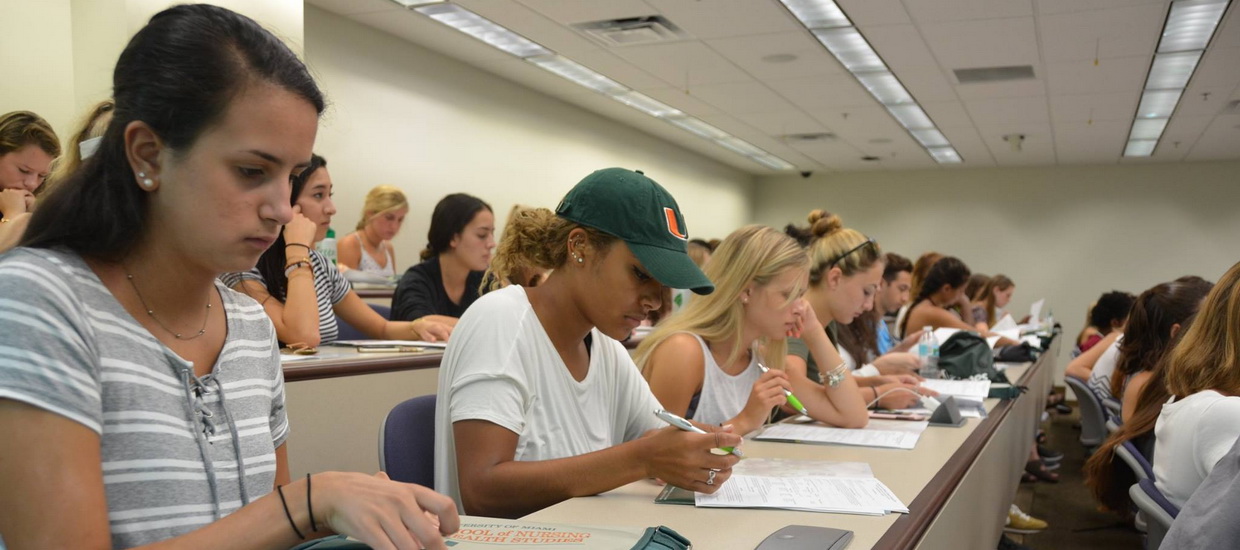1. Why should I enroll in a B.S.N.-to-D.N.P. program?
The National Organization of Nurse Practitioner Faculties committed to move all entry-level nurse practitioner (NP) education to the D.N.P. degree by 2025. The demand for D.N.P.-prepared nurses continues to grow as employers are quickly recognizing the important and unique contributions these expert nurses make in the current complex health environment. A 2015 national study released found near-universal agreement among nurse educators about the value of the D.N.P. in preparing individuals for advanced nursing practice.
2. What sets the University of Miami’s B.S.N. to D.N.P. program apart?
In addition to the U’s world-class location and academic reputation, our program has established itself among the forerunners in Doctor of Nursing Practice education. We launched one of the nation’s first executive-style M.S.N. to D.N.P. degree programs in 2009 and Florida’s first B.S.N.-D.N.P. in Nurse Anesthesia in 2014. Our success is attributed to rigorous academic standards and unique clinical experiences through partner systems like UHealth and Jackson Health. Unlike most programs, we offer no-fee preceptorships. In addition, our top-notch faculty, instructors, and guest lecturers include hospital executives at the forefront of their profession and veteran policy experts, such as former U.S. Secretary of Health and Human Services Donna E. Shalala. From Day 1, our students are engaged in doctoral-level, leadership, and clinical courses, with final semester(s) focused on clinical specialty area and preparation for national board exams. We also incorporate state-of-the art simulations in most course work across the curriculum to help students learn to clinically apply didactic principles.
3. What are my career prospects?
Doctorally prepared nurse practitioners are increasingly in demand, especially in Florida. Labor demand for nurse practitioners in Florida is expected to increase by 45% by 2026, compared to 36% nationally. Graduates of our streamlined D.N.P. curriculum consistently boast national certification pass rates above the national average. Our graduates are not only clinical experts—prepared to manage young adult, adult, and elderly patients across the wellness-to-illness health care continuum in a variety of acute inpatient and outpatient settings—they are leading professionals significantly influencing health care delivery and the development of health care systems and policies locally and nationally.
4. What kind of salary can I expect?
According to ZipRecruiter, the average annual pay for a D.N.P. in Florida as of March 2021 was $96,000. Depending on specialization area, geographic location, and other factors, annual salaries may range from $72,000 to $205,000.
5. Who is admitted to this program?
We are very interested in creating a dynamic cohort of students. All students must be registered nurses in the State of Florida to start the program. If admitted, students must also pass a drug screening, a background check, have a current CPR certificate, and required immunizations. Interviews are scheduled in person or virtually.
Please note that D.N.P. admissions are conducted on a case-by-case basis. The faculty of the School of Nursing and Health Studies reserves the right to waive any requirement or request additional information from applicants.
6. How long is the program?
We have a full-time and part-time plan. The full-time plan is 6 consecutive semesters (Summer, Fall, Spring). Students enrolled in the full-time program are strongly discouraged from engaging in any employment commitments. The part-time plan is an 11-semester hybrid program, offering the flexibility of evening and weekend classes, as well as some instruction conveniently located on the UHealth campus for those interested.
7. What is the scholarly project?
The scholarly project is a practice initiative that involves identifying a problem, and formulating an intervention. This problem can be clinical, administrative, policy, educational, or research.
8. How does simulation add to my education?
High-fidelity simulation and partial task training enables students and health care providers to improve clinical assessment and critical thinking skills without compromising patient safety. Simulation in our five-story, 41,000-square-foot facility provides hands-on experience with real-life conditions in a controlled environment, leading to improved patient care, increased provider safety and stronger health care teams. Teamwork and communication are major components of each simulation so we can develop better interdisciplinary collaboration.
9. What is required for national certification?
AACN requires at least 1000 direct care clinical hours.
10. Will I get my M.S.N. degree as well as my D.N.P. in this program?
No, your degree will be a D.N.P. degree.
11. Do I need to take the GRE for admission?
GRE scores are not required for admission to this program.
12. I have a bachelor’s degree in a non-nursing area. Am I eligible to apply to your program?
Registered nurses with baccalaureate degrees in another discipline may apply to the program if they are clinically prepared and have sufficient formal education in science for master’s and doctoral level coursework.
13. Where can I get more information about applying, housing, and other program details? If you have any other questions regarding the application process, please contact the School of Nursing and Health Studies, Office of Student Services at (305) 284-4325 or email sonhs@miami.edu. You can apply on-line via NursingCAS 3.0 at https://portal.nursingcas.org. For housing questions, contact the UM Housing office at (305) 284-4505, or via email at housing@miami.edu.





